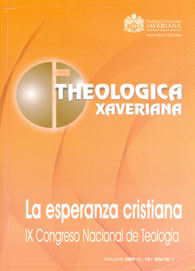Abstract
El problema del mal en la vida humana y en la historia es una pregunta recurrente en todos los tiempos. La respuesta, en un mundo sacralizado, hace referencia a la acción misteriosa de Dios en el mundo, que no se puede explicar: si Dios es bueno, ¿por qué permite el mal? Si Dios es omnipotente, ¿por qué
existe el mal? En un mundo secularizado, como el nuestro, la respuesta se ubica en lo intramundano, y ha de ser más radical: el mal se explica por la finitud del hombre (en este sentido no es necesario “echarle la culpa a Dios”). Sin embargo, al tratar de buscar un “sentido” al mal y a la lucha contra el mal hay
varias aproximaciones limitadas: se trata de un problema práctico que se debe resolver lo mejor posible; se propone una glorificación de las víctimas (“victimización”). El compromiso de amor de Dios con el hombre y el mundo nos lleva a una visión de esperanza ante el mal que cuenta con la realidad del mal:
no existe el mundo-sin-mal. Sin embargo, Dios se ha comprometido con un amor misericordioso, en la cruz y en la resurrección de Cristo, con la lucha contra el mal, su triunfo definitivo es realizado en la resurrección, y lo esperamos en la vida otro-mundana, que empieza a realizarse en este mundo
This journal is registered under a Creative Commons Attribution 4.0 International Public License. Thus, this work may be reproduced, distributed, and publicly shared in digital format, as long as the names of the authors and Pontificia Universidad Javeriana are acknowledged. Others are allowed to quote, adapt, transform, auto-archive, republish, and create based on this material, for any purpose (even commercial ones), provided the authorship is duly acknowledged, a link to the original work is provided, and it is specified if changes have been made. Pontificia Universidad Javeriana does not hold the rights of published works and the authors are solely responsible for the contents of their works; they keep the moral, intellectual, privacy, and publicity rights.
Approving the intervention of the work (review, copy-editing, translation, layout) and the following outreach, are granted through an use license and not through an assignment of rights. This means the journal and Pontificia Universidad Javeriana cannot be held responsible for any ethical malpractice by the authors. As a consequence of the protection granted by the use license, the journal is not required to publish recantations or modify information already published, unless the errata stems from the editorial management process. Publishing contents in this journal does not generate royalties for contributors.


